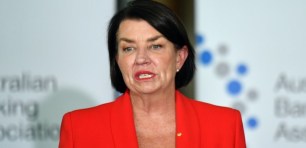
Independent reviewer Mike Callaghan(AAP Image/Paul Miller).
Arbitrary debanking of sole traders and small businesses by financial institutions is a longstanding problem.
Now Australia’s banks have doubled down on the reasons they believe they should not be required to tell customers or potential customers why they can’t have basic banking services. In most cases of debanking, facilities are denied or withdrawn on the basis of occupation or industry.
According to the Australian Small Business and Family Enterprise Ombudsman, such businesses include cryptocurrency traders, brothels, individual sex workers and sex shops, tattoo parlours and precious metal traders. Cases have also been reported among firearms dealers, vaping retailers, mining companies and the agriculture and farming sector.
A typical example was high-profile Sydney escort Samantha X who last year reported her long-standing account with ING had been shut down. When she asked for an explanation, she said she was told: “We can’t tell you why sorry, it is a business decision.”
And in its submission to the 2021 Banking Code Review, Sex Work Law Reform Victoria cited the case of a brothel owner who was not only handed a “lifetime ban” by his bank, but they also closed down the accounts of family members unrelated to his business.
The ongoing issue was highlighted a year ago by independent reviewer Mike Callaghan, who was commissioned by the Australian Banking Association (ABA) to conduct the three-yearly review of the banking industry’s code of conduct.
In his report, Callaghan rebuked the banks for what he called “blanket denial” of services seemingly with regard to the customer’s occupation on the basis that they are concerned the AUSTRAC anti-money laundering provisions may come into play.
It should be pointed out here that in a statement on debanking, AUSTRAC itself says the effect of debanking on legitimate and lawful businesses can increase the risks of money laundering and terrorism financing, and that AUSTRAC “continues to discourage the indiscriminate and widespread closure of accounts across entire financial services sectors”.
Callaghan acknowledged that banks can decide who they want as customers on grounds of legitimate concerns, but he recognised submissions asserting that in many cases a bank provides no reason for denying or withdrawing services and does not respond to requests from customers for an explanation.
Specifically, Callaghan recommended:
“A customer should not be denied a banking service, or have an account closed, without the bank raising it with the customer and giving the customer an opportunity to respond, where consistent with AUSTRAC guidance. If the service is denied, or account closed, the bank should give a reason, where appropriate. Such decisions should be on a case-by-case basis. The Banking Code Compliance Committee (BCCC) should consider undertaking an inquiry into banks’ performance in accordance with these commitments.”
After taking 12 months to consider Callaghan’s 116 recommendations, the ABA has now released its response to the many issues raised. With regard to debanking, ABA says it will not “at this time” support giving an explanation to debanked customers.
The ABA argues: “Banks need the ability to use discretion depending on the circumstances. In some cases, it is not appropriate or lawful to give the customer reasons for its decision (including the imposition of criminal penalties for breaches).”
The ABA said it would reconsider the issue after the federal government completes examining advice provided to it by the Council of Financial Regulators (and also AUSTRAC and ACCC) examining the drivers of debanking and potential policy options.
That advice from the Council of Financial Regulators included that if banks don’t voluntarily change their practices, a package of legislative reforms will be necessary. The Council also cited a previous suggestion that the powers of the Australian Financial Complaints Authority be expanded to intervene in debanking complaints.
In summary, the ABA’s response appears to be: “No, we won’t agree to change our practices, or tell businesses or individuals why they have had financial services denied or withdrawn, until we are forced to do so.”
It is a disappointing stance for an industry that is already under fire for its lack of transparency.
Dr Tony Jaques is an expert on issue and crisis management and risk communication. He is CEO of Melbourne-based consultancy Issue Outcomes and his latest book is Crisis Counsel: Navigating Legal and Communication Conflict.
Handpicked for you

What do the latest recommendations on the Banking Code of Practice mean for SMEs?



COMMENTS
SmartCompany is committed to hosting lively discussions. Help us keep the conversation useful, interesting and welcoming. We aim to publish comments quickly in the interest of promoting robust conversation, but we’re a small team and we deploy filters to protect against legal risk. Occasionally your comment may be held up while it is being reviewed, but we’re working as fast as we can to keep the conversation rolling.
The SmartCompany comment section is members-only content. Please subscribe to leave a comment.
The SmartCompany comment section is members-only content. Please login to leave a comment.